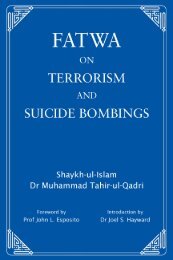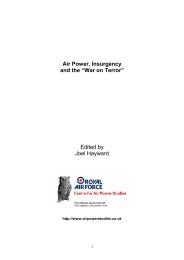Air Power, Insurgency and the âWar on Terrorâ - Prof. Joel Hayward's ...
Air Power, Insurgency and the âWar on Terrorâ - Prof. Joel Hayward's ...
Air Power, Insurgency and the âWar on Terrorâ - Prof. Joel Hayward's ...
Create successful ePaper yourself
Turn your PDF publications into a flip-book with our unique Google optimized e-Paper software.
The use of <str<strong>on</strong>g>Air</str<strong>on</strong>g> <str<strong>on</strong>g>Power</str<strong>on</strong>g> Today: Have New Ethical Challenges Occurred?<br />
power gives us huge advantages, but its limitati<strong>on</strong>s <str<strong>on</strong>g>and</str<strong>on</strong>g> wr<strong>on</strong>gful use can cause ethically<br />
questi<strong>on</strong>able judgments <str<strong>on</strong>g>and</str<strong>on</strong>g> acts.<br />
The Ethics of Distance<br />
Assistant <strong>Prof</strong>essor Ole Jørgen Maaø pointed out that <str<strong>on</strong>g>the</str<strong>on</strong>g> distance from shooter to target<br />
has increased tremendously <str<strong>on</strong>g>and</str<strong>on</strong>g> “this distance will probably increase”. 554 In additi<strong>on</strong>,<br />
Christopher Coker states: “The new technologies have drawn <str<strong>on</strong>g>the</str<strong>on</strong>g> military into a world<br />
in which reality is meditated or simulated. This is <strong>on</strong>e of <str<strong>on</strong>g>the</str<strong>on</strong>g> ethical dilemmas of <str<strong>on</strong>g>the</str<strong>on</strong>g><br />
American way of warfare, because it creates an encounter that is qualitatively different<br />
from before – <strong>on</strong>e that has little or no reference to us. What <str<strong>on</strong>g>the</str<strong>on</strong>g> warrior sees <strong>on</strong> <str<strong>on</strong>g>the</str<strong>on</strong>g><br />
computer screen is also real. The percepti<strong>on</strong> of reality becomes reality”. 555 This quotati<strong>on</strong><br />
indicates that l<strong>on</strong>g distance is <strong>on</strong>e of <str<strong>on</strong>g>the</str<strong>on</strong>g> characteristics of new technology <str<strong>on</strong>g>and</str<strong>on</strong>g> especially<br />
of air power.<br />
Distance prevents airmen from seeing <str<strong>on</strong>g>the</str<strong>on</strong>g> effects of <str<strong>on</strong>g>the</str<strong>on</strong>g>ir weap<strong>on</strong>s. Modern technology<br />
compensates for this by giving airmen <str<strong>on</strong>g>the</str<strong>on</strong>g> ability to see buildings <str<strong>on</strong>g>and</str<strong>on</strong>g> pers<strong>on</strong>nel that<br />
have been blown up. Yet it is all presented <strong>on</strong> screens <str<strong>on</strong>g>and</str<strong>on</strong>g> m<strong>on</strong>itors, completely free of<br />
<str<strong>on</strong>g>the</str<strong>on</strong>g> noise <str<strong>on</strong>g>and</str<strong>on</strong>g> smell of <str<strong>on</strong>g>the</str<strong>on</strong>g> battlefield. The battlefield <str<strong>on</strong>g>and</str<strong>on</strong>g> war itself – for aircrew – have<br />
increasingly become a c<strong>on</strong>ceptual <str<strong>on</strong>g>and</str<strong>on</strong>g> syn<str<strong>on</strong>g>the</str<strong>on</strong>g>tic world. What is <str<strong>on</strong>g>the</str<strong>on</strong>g> difference today<br />
between a simulated bombing missi<strong>on</strong> <str<strong>on</strong>g>and</str<strong>on</strong>g> a live missi<strong>on</strong>? 556 If <str<strong>on</strong>g>the</str<strong>on</strong>g>re is no difference what<br />
effect does it have <strong>on</strong> <str<strong>on</strong>g>the</str<strong>on</strong>g> ethical c<strong>on</strong>science of airmen? Christopher Coker addresses<br />
this complex issue. He claims that physical distance – as provided by technology – is in<br />
danger of being transformed into disassociati<strong>on</strong> in two ways. 557 First <str<strong>on</strong>g>the</str<strong>on</strong>g>re is a mental<br />
disassociati<strong>on</strong>, since operators are increasingly cut off from <str<strong>on</strong>g>the</str<strong>on</strong>g> c<strong>on</strong>sequences of <str<strong>on</strong>g>the</str<strong>on</strong>g>ir acts.<br />
Sec<strong>on</strong>dly, reality is increasingly presented by computers. In sum, he claims that pilots are<br />
increasingly cut off from taking resp<strong>on</strong>sibility for <str<strong>on</strong>g>the</str<strong>on</strong>g>ir acts. I think that <str<strong>on</strong>g>the</str<strong>on</strong>g>se observati<strong>on</strong>s<br />
– combinati<strong>on</strong> of technology, air power <str<strong>on</strong>g>and</str<strong>on</strong>g> distance – create a sort of alienati<strong>on</strong> from<br />
<str<strong>on</strong>g>the</str<strong>on</strong>g> traditi<strong>on</strong>al battlefield. My claim is that distance, due to <str<strong>on</strong>g>the</str<strong>on</strong>g> characteristics <str<strong>on</strong>g>and</str<strong>on</strong>g> <str<strong>on</strong>g>the</str<strong>on</strong>g><br />
increasing use of air power, has created <str<strong>on</strong>g>and</str<strong>on</strong>g> will create ethically challenging situati<strong>on</strong>s.<br />
The danger is that airmen put a mental distance between <str<strong>on</strong>g>the</str<strong>on</strong>g>mselves <str<strong>on</strong>g>and</str<strong>on</strong>g> what happens<br />
<strong>on</strong> <str<strong>on</strong>g>the</str<strong>on</strong>g> ground <str<strong>on</strong>g>and</str<strong>on</strong>g> <str<strong>on</strong>g>the</str<strong>on</strong>g>n let this distance influence <str<strong>on</strong>g>the</str<strong>on</strong>g>ir judgment.<br />
I refer <strong>on</strong>ce again to Coker c<strong>on</strong>cerning <str<strong>on</strong>g>the</str<strong>on</strong>g> impact of distance up<strong>on</strong> soldiers:”[greater<br />
distance] suggest that emoti<strong>on</strong>ally <str<strong>on</strong>g>and</str<strong>on</strong>g> psychologically soldiers will c<strong>on</strong>tinue to become<br />
increasingly detached from <str<strong>on</strong>g>the</str<strong>on</strong>g> enemy”. 558 Lieutenant Col<strong>on</strong>el David Grossmann verifies<br />
this by arguing that <str<strong>on</strong>g>the</str<strong>on</strong>g>re is a c<strong>on</strong>necti<strong>on</strong> between <str<strong>on</strong>g>the</str<strong>on</strong>g> physical distance to a victim <str<strong>on</strong>g>and</str<strong>on</strong>g><br />
<str<strong>on</strong>g>the</str<strong>on</strong>g> reluctance to kill. 559 He asserts that it is easier to kill people when <str<strong>on</strong>g>the</str<strong>on</strong>g> physical distance<br />
increases. The resistance to killing is inversely proporti<strong>on</strong>al to <str<strong>on</strong>g>the</str<strong>on</strong>g> distance to <str<strong>on</strong>g>the</str<strong>on</strong>g> target.<br />
He has illustrated this increased resistance to killing in <str<strong>on</strong>g>the</str<strong>on</strong>g> following diagram 560 :<br />
232<br />
<str<strong>on</strong>g>Air</str<strong>on</strong>g> <str<strong>on</strong>g>Power</str<strong>on</strong>g>, <str<strong>on</strong>g>Insurgency</str<strong>on</strong>g> <str<strong>on</strong>g>and</str<strong>on</strong>g> <str<strong>on</strong>g>the</str<strong>on</strong>g> “War <strong>on</strong> Terror”





